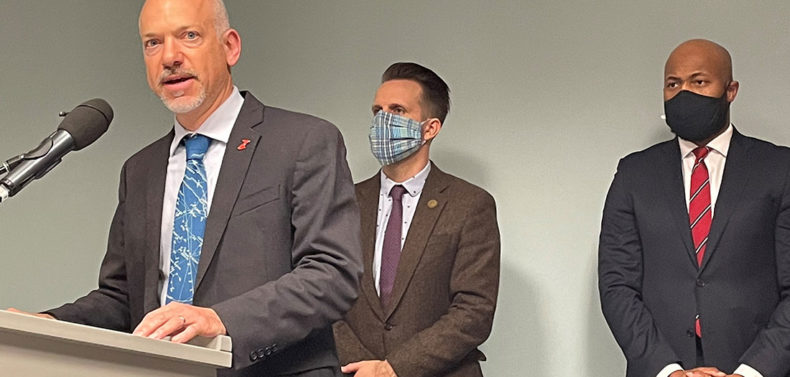Athens-Clarke County isn’t alone fighting Republican legislators’ efforts to unilaterally redraw local district lines. It’s happening in Democrat-controlled counties all over the state, including two suburban Atlanta counties that recently flipped from red to blue.
In Cobb County, Republicans in the state House recently passed a map that would shore up two Republican commissioners while pairing two Democrats in the same district and creating an open seat. In Gwinnett County, Rep. Bonnie Rich, the former reapportionment committee chair, drew a map that creates a Republican-leaning commission district at the expense of dividing minority communities. In Augusta-Richmond County, a unified government like ACC that’s also trending toward Democratic, residents have accused Republicans of “packing” Black voters into districts in order to reduce their overall influence. It’s a similar story in Chatham County, home of Savannah, where GOP legislators rejected a local map drawn by a nonpartisan committee because two Republican commissioners complained about their new districts.
In a Republican stronghold until 2018, Democrats now hold all five seats on the Gwinnett County Commission. According to Commissioner Kirkland Carden, in creating a Republican seat in north Gwinnett, Rich split heavily Hispanic and Asian communities in the eastern part of the county, as well as the historically Black “Promised Land” community in South Gwinnett.
“Let me be clear: this new map was forced upon the people of Gwinnett,” Carden said at a news conference in Lawrenceville Feb. 23. “This is a naked partisan power grab and an attempt by Gwinnett Republicans to regain power in a county where most voters have rejected their style of politics.”
ACC Mayor Kelly Girtz—who attended the news conference along with commissioners Russell Edwards, Tim Denson and Melissa Link—agreed with Carden’s assessment. As the ACC Commission has grown more progressive over the past four years, “we’ve seen some pushback,” he said.
“We are in a changing Georgia. We are moving to an inclusive version of this state,” Girtz said. “As we move into this era, what we are seeing is the last gasp of a political dynasty.”
Ted Terry, a Democratic DeKalb County commissioner, also said the GOP is trying to cling to power in a rapidly changing state. “They don’t want to adapt or evolve,” he said. “They don’t want to broaden their tent and take in new coalitions.”
Redistricting occurs once a decade to balance populations after each Census, and ordinarily, after holding public hearings, local governments submit maps to their local legislative delegation, which are passed en masse as a matter of courtesy. But since Cobb and Gwinnett have also elected more Democratic state lawmakers than Republicans in recent years, Republicans went around the local delegations, taking their maps straight to the full House and Senate where they still hold the majority. (Because of ACC’s relatively small size, the GOP has been able to gerrymander local districts so that the Democratic city is represented in the General Assembly by four Republicans out of five.)
Curt Thompson, a lawyer and former Gwinnett state senator, said the process Republicans are using is unprecedented. “This is by far the most partisan reapportionment process as far as local redistricting that I have ever seen” going back to 1990, Thompson said.
Republican legislators have justified their maps by saying they’re more compact and would boost minority representation. But Girtz said the new ACC map would slice and dice neighborhoods, dividing historically Black East Athens and the suburban subdivisions on the Eastside, each of which has always had its own district.
The massive changes could catch voters by surprise. In Gwinnett, 40% of voters will find themselves in new commission districts this year; that figure is 67% in ACC. Carden predicted “a lot of chaos, disruption and angry emails.”
In addition, if the GOP map holds up in court, Link, Edwards and Denson will not be able to run for re-election because their homes were drawn into even-numbered districts that won’t be on the ballot until 2024. That amounts to “a petit coup of our local government,” Link said, “overthrowing 30% of the commission with no input from voters.”
Denson, also the chair of the ACC Democratic Committee, said former state attorney general Mike Bowers has been retained and is looking into a potential lawsuit. But candidates are also proceeding as if the new map will take effect. “I’m certain we’re still going to have strong progressive candidates,” Denson said.
Carden said there are no plans to sue in Gwinnett, but he is counting on voters to make their voices heard at the ballot box in the May primaries and November general election.
“Now more than ever, getting out and voting matters,” Thompson said. “Even in these gerrymandered districts, the margins are still tight.”
Like what you just read? Support Flagpole by making a donation today. Every dollar you give helps fund our ongoing mission to provide Athens with quality, independent journalism.










